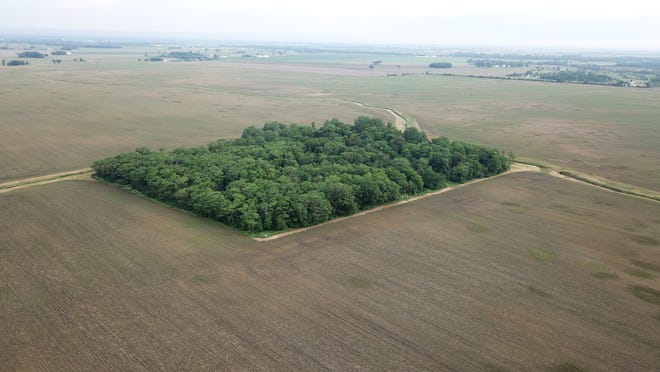
A new state law that took effect Monday gives local government the upper hand in controlling solar and wind energy projects, and Delaware County commissioners wasted no time in supporting the measure
Senate Bill 52 enables counties to set up restricted areas within their unincorporated boundaries where wind and solar projects greater than 50 megawatts would be prohibited.
Renewable energy: DeWine signs bill adding local input, additional hurdle for wind and solar projects in Ohio
Commissioners Jeff Benton, Barb Lewis and Gary Merrell — all of them Republicans —each support the law. They instructed the county’s legal adviser during a meeting Monday to draft a resolution that they could vote on to create the district.
The commissioners shared several of their concerns about solar farms in the county, including worries about their impact on development and the environment, lack of sunshine in Ohio and uncertain payoffs to landowners.
“They’re reluctant to engage in a transaction like this because this would tie up their land for 20 to 30 years,” Benton said of landowners he’s heard from. “I’m not hearing any interest.”
Residents could use a referendum to challenge decisions by officials
Aric Hochstettler, staff attorney for the commissioners, recommended the “blanket” restriction instead of a “selective” approach where certain areas would be open to solar or wind development. Much of the northern half of the state’s fastest-growing county is rural and undeveloped.
Hochstettler cautioned the commissioners, however: “When you put a prohibition in place, or a moratorium in place, you’re telling those property owners that you can’t do something with your land.”
He said that litigation might arise if objective criteria for denying projects were not in place. A countywide restriction would lessen that likelihood.
Under the law approved by a Republican-controlled Ohio legislature, residents could use a referendum to challenge decisions by officials they disagree with.
Merrell said after the meeting that the county is not trying to be restrictive — or anti-wind or solar — and that the proposed restricted area is “an effort to manage the process” and protect landowners’ interests.
‘Maybe Delaware County feels they don’t need that’
Alternative energy advocates were quick to criticize the law and how Delaware County wants to apply it as over-reaching and fiscally unwise based on tax and other advantages that wind and solar farms afford.
The new law gives “an extraordinary amount of decision-making power” to local government, “something they don’t have over power plants or other fossil fuel operations,” said Jane Harf, executive director of Green Energy Ohio.
“These facilities pay significant taxes to help support government services and schools,” she continued. “Maybe Delaware County feels they don’t need that.”
The restrictions also deprive farmers of the opportunity to reap the benefits of guaranteed payments during uncertain times amid climate change and shifting weather patterns, Harf said.
Hochstettler told commissioners that landowners would still have the opportunity to present future plans for solar developments that would be considered individually by officials.
The county’s position is contrary to that of most of its neighbors.
Madison County currently has commitments from several solar companies to build large solar farms, including a 6,300-acre farm owned by Bill Gates that could become the site of one of the nation’s largest solar farms.
Solar energy: Could Bill Gates’ Madison County farm become massive solar energy site near Columbus?
“We trust that the property owners understand the value of their land and its potential for development,” said David Kell, executive director of the Madison County Chamber of Commerce. “We want to encourage solar and see it do well in Madison County.”
Of the six counties bordering Delaware, only two, Morrow and Knox, have no planned solar farms. Union and Licking counties each have two, according to the Ohio Power Siting Board, which supports sound energy policies and oversees installation of energy capacity and transmission infrastructure.
Jeff Dickinson, a working farmer and executive director of the nonprofit Stratford Ecological Center in Delaware, is a strong supporter of landowner rights, but hasn’t heard from many farmers willing to convert to solar farms.
“I would not label Delaware County a green county,” he said.
“I’m a big fan of renewable energy and any climate mitigation efforts we can put in place,” Dickinson said. But he favors installation of solar panels on structures like barns, rather than in large fields.
“Once that land goes under any kind of structure, it is not considered prime agricultural land anymore,” Dickinson said. “It could take a generation to return it.”
dnarciso@dispatch.com
@DeanNarciso
